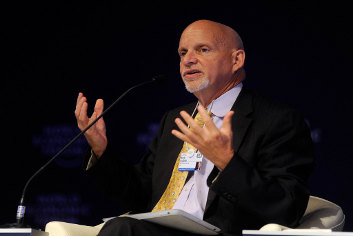Occupy Wall Street protests have spread across USA behind the rallying cry that the “99%” have been left behind. There is a sense of outrage that the “system” is not just rigged in favor of the elite – something like the top 1% – but has spun out of control, leading to an accelerating concentration of wealth and power into the hands of the very few. Wage stagnation, the explosion of health and education costs as the American welfare state shrinks, and above all the financial manipulation of debt has generated extraordinary profits on Wall Street and massive debt and housing foreclosures on Main Street. The taxpayer, who is told there is no alternative, replaces losses from outrageous risk-taking by “too-big-to-fail” financial institutions. This new gilded age political-economic system can be thought of as a trifecta of a highly degraded educational system, a financial system that is unregulated by both law and social norms, and a political system increasingly corrupted by money. The educational system has promoted a meritocracy of cumulative advantage. The vast majority of American students experience primary and secondary schools in which they fall far behind their peers in much of the rest of the developed (and even less-developed) world; they then face costs of higher education that produce a level of debt that cannot possibly be repaid out of their earnings. But the elite reproduces itself with the ability to pay for college and graduate school educations, while simultaneously feeling accomplished by their success given the extraordinary competition within the educational system. The financial sector has been systematically deregulated as free market orthodoxy took off in the 1980s. This deregulation served to extract resources from the “real” economy and concentrate it in the bank accounts of a tiny elite, who are the same victors of the Darwinian educational competition. As the concentration of income at the very top of the population took off in the 1990s-2000s, spectacular displays of conspicuous consumption became commonplace. At the same time, a political system corrupted by the absence of meaningful limits for special interest campaign spending could not rein in the financial sector by setting limits to risk-taking, even after both the magnitude of the recent crisis, as well as its causes were plain to see. In the face of all this, what in the end has been the rallying cry of protest at Occupy Wall Street and beyond? A simple statistic, originally generated in a technical article in a leading economics journal by Thomas Piketty and Emmanuel Saez. Their work told the story of a staggering increase in the share of after-tax income received by those with top incomes since the 1970s. Piketty in french, on a just fiscal system:
Related Articles
The best entrepreneurs may be living on the streets
the concept of child finance
the strategy of the Rubicon programs
the action of Civic Venture
Will we ever understand poverty?
the Poor Economics thinkers Duflo and Banerjee
What if your employees want to engage?
the proposal of Earthshare
increasing the success of social enterprises
the work of Proximity Designs
Choose who you want to cure today
Watsi and the Crowdfunding for patients
TTurkey: Perhaps one of the biggest lessons of the pandemic has been the urgent need to reassess our priorities, including the idea of ‘business as usual’, says Richard Betts, Sustainability Director at KPMG, in an interview with OLBIOS.
Making SDGs work: A private sector perspective
Germany: Julian Bents, CEO & Founder of Tomorrow is Now, shows how current corporate efforts towards achieving Sustainable Development Goals, while admirable, leave much to be desired
![]()
STAY IN TOUCH
SUBSCRIBE TO OUR NEWSLETTER
AND RECEIVE OUR LATEST STORIES










